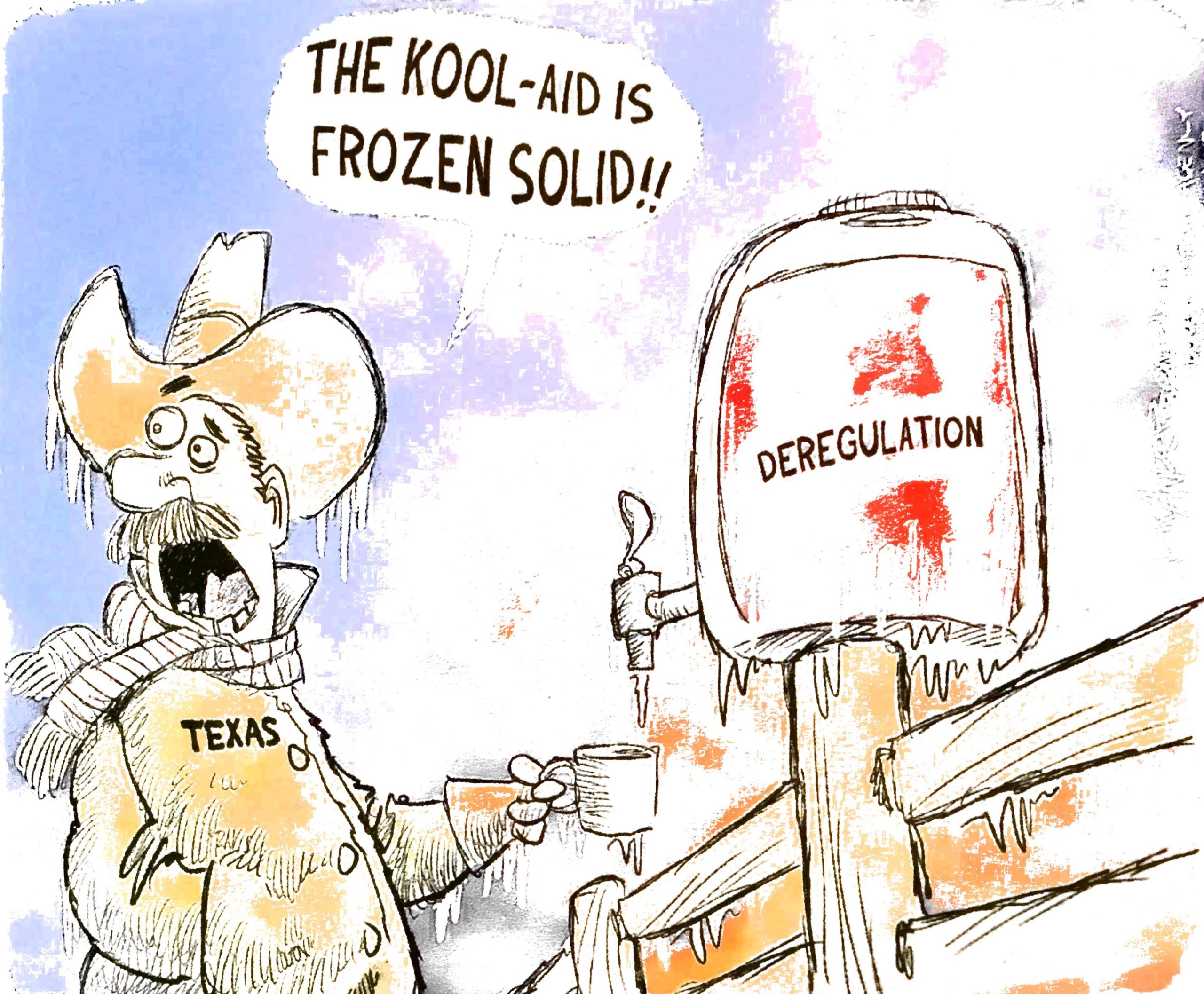When a natural disaster struck Texas (an uncommonly long freeze in a normally balmy state) many electrical power generating stations shut down because they were not sufficiently “weatherized” to operate in the extremely cold weather. Electricity was rationed with rolling blackouts (two or more hours a day when the power was cut-off) and several municipal water systems failed when pipes froze and electrical pumps stopped pumping. But it was a different systemic failure, a market failure, that caught the eye of Russian media (RT News).
Texas, itself a former Republic, is famously independent politically. “Free markets”, meaning free of the state’s regulatory control, are idealized. “Social control” epitomized by government intervention, is scorned. The belief is that “free markets” are more economically efficient and provide better societal benefits overall. I don’t disagree. But there are some markets that warrant some modicum of government control, even if only to protect vulnerable populations from being fleeced by the avarice of those individuals in control of the market. The energy market, because access to energy (in the form of electricity, at least) is so fundamental to life in the U.S., is just such a market.
What caught the attention of RT News (and many other U.S. news outlets) was that a few utility customers who had agreed to pay a floating “market rate” for their electricity, and who usually benefited by paying about half of the typical $0.09 / KwH “fixed rate”, got stung when power generation plummeted overnight. As electricity supplies tightened, “market” prices for electricity temporarily skyrocketed. Because the electrical utilities could not pass on those higher costs to their fixed rate customers but were otherwise entitled to operate “profitably” they passed those higher costs on to the minority of their customers who had agreed to pay “market rates”. Power bills that were usually $200 per month jumped to $11,000 per week for that short period of time before all the power plants returned to service.
This will all get sorted out as a matter of contract and/or a legislative fix. It seems obvious to me that the “market rate” customers should bear only their share of the short-term rate increase, as agreed, and that the electricity companies should bear the remaining share relating to their “fixed rate” customers. If that’s not “profitable” then the remedy should be to charge “fixed rate” customers more going forward to ensure that the utility companies can continue to pay a reasonable return on investment to their owners. I don’t believe that the “market rate” customers could reasonably object to covering their bets as rates increased even as they benefited tremendously when market rates were low.
RT News sold the story differently. Gleaning from domestic news stories, RT News led with this line: Texas infrastructure wasn’t ready for the winter storm that paralyzed the state this week, and its unfair that the working people are now forced to pay the price, a local woman, who received a shocking power bill, told RT. Because of the attribution this “news” is not fake, although it is misleading.
The gist of the RT News story was that the utility companies’ bills to “market rate” customers evidence an inherent downside in all “free market” economic systems. This perspective buttresses the Russian government’s criticism of U.S. “free market” ideology generally and – as the English language news feed is intended – provides an arguably counter-productive alternative narrative to those U.S. citizens who feel economically vulnerable generally. Because the English language RT News story was otherwise duplicative of domestic news stories its purpose was evidently to persuade rather than to inform (e.g. “its unfair that the working people are now forced to pay the price“). It’s not fake, but neither is it “news”.
I would welcome any similarly critical analysis of a U.S. news media account of a Russian problem or event. I am certain that domestic biases often distort or “color” accounts of international events. To me, the best way to avoid distortion is to support ethically principled, governmentally and financially independent news organizations. In all countries.

